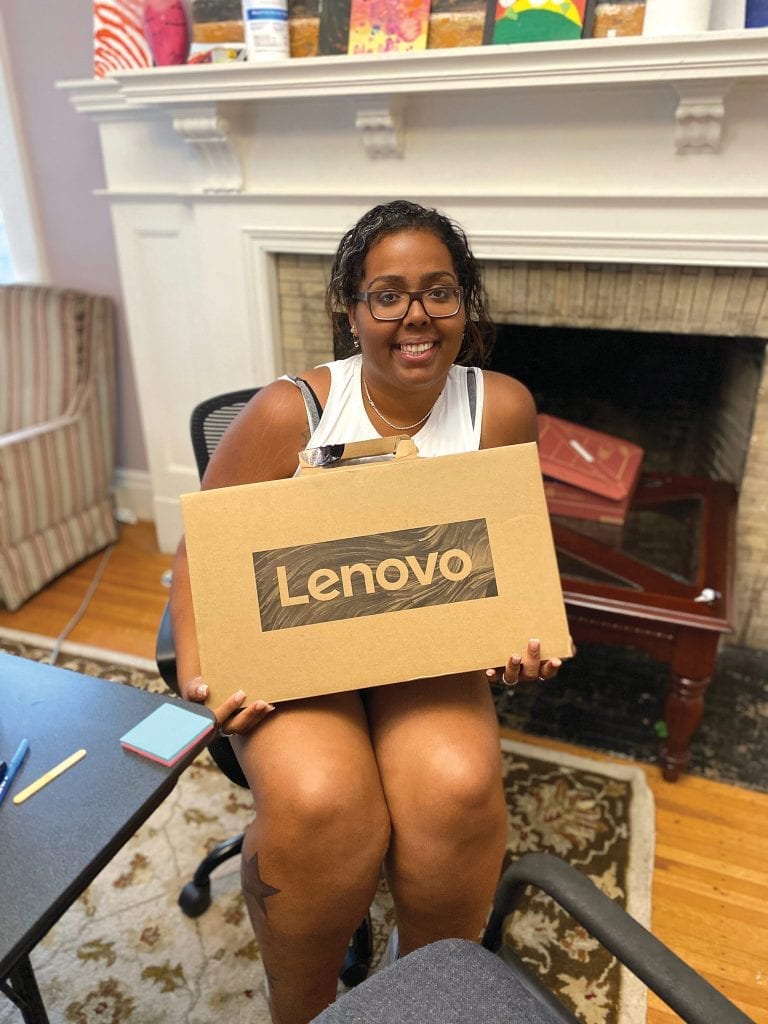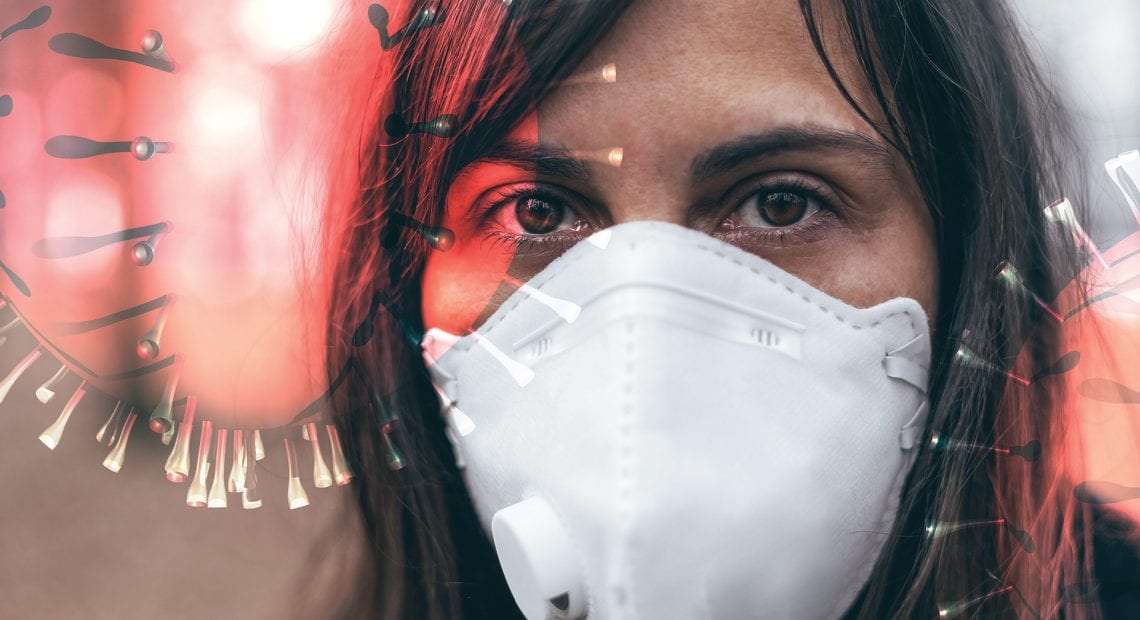Impossible Choices

The Dress for Success Western Massachusetts digital-literacy program has helped numerous women like Carolyn, who was provided with equipment and coaching to start an online business.
It’s a setback that could take years, even decades, to reverse when it comes to economic equality for women.
About 617,000 women left the U.S. workforce in September, compared with only 78,000 men — nearly eight times as many. About half the women who dropped out are in the prime working age of 35 to 44.
“One of our strategic plans centers around economic security for women and girls,” said Donna Haghighat, CEO of the Women’s Fund of Western Massachusetts. “Obviously, that’s more important now, because many women are concentrated in low-wage jobs to begin with, and a lot of those jobs — ones traditionally filled by women — have disappeared because of the pandemic.”
According to a recent study by the National Bureau of Economic Research, the pandemic-fueled recession is tougher for women for two main reasons. First, as Haghighat noted, the crisis has battered industry sectors in which women’s employment is more concentrated, including restaurants, retail, hospitality, and healthcare. This was not the case in past recessions, which tended to hurt male-dominated industry sectors like manufacturing and construction more than other industries.
Second, the COVID-driven economic shutdowns have closed schools and daycare centers around the country, keeping kids at home and making it harder for parents — especially mothers, who tend to provide the majority of childcare — to keep working.
“The pandemic has really impacted women disproportionately in terms of not being able to go to work so they can help their kids learn,” said Margaret Tantillo, executive director of Dress for Success Western Massachusetts, an organization that empowers women to achieve economic independence. “It’s frustrating for parents to be sitting at home and trying to do what they need to do as well as help their children learn. A lot of women have several children at home.”
According to the study, among married parents who both work full-time, the mother provides, on average, about 60% of childcare. And when schools started up remotely last month, it further strained parenting demands. That contrast in accepted gender roles has contributed to a mass exodus of women from the work world that could have long-lasting ramifications.
“The pandemic has really impacted women disproportionately in terms of not being able to go to work so they can help their kids learn.”
“We have folks who are voluntarily dropping out of the job market, particularly women, because of the competing demands in terms of remote learning for children,” Haghighat told BusinessWest. “They have to navigate all that. Even if it’s a working couple, women tend to make less money, so if something has to give, and someone has to give up their job for a while, it tends to be the woman because she’s already making less money. That’s what we’re seeing.”
At the same time, according to a study by management-consulting firm McKinsey, while women account for 39% of the global workforce, they are overrepresented in three of the four hardest-hit sectors during the pandemic: accommodation and food services (54%), retail and wholesale trade (43%), and services such as arts, recreation, and public administration (46%). In addition, only 22% of working women have jobs that allow them to telecommute, compared with 28% of male workers.
The numbers get worse for women of color; while the U.S. female jobless rate remained at 8% in September, it’s higher for black and Hispanic women.
“Economic inequality was here before COVID-19. The pandemic just showed us how big this gap is and how deep the disparity goes,” said Tanisha Arena, executive director of Arise for Social Justice in Springfield, adding that some individual success stories have been wiped out.
“Some businesses will never open back up because they didn’t survive the pandemic,” she noted. “How many women own those businesses, or work at those businesses? The effect will be long-lasting. When you’ve lost your job and it’s not coming back, how do you pay your bills?”
Holding Up the Pillars
Still, last month’s massive decline in female employment is at least partially — and possibly mostly — due to the lack of childcare options, Russel Price, chief economist at Ameriprise, told CNN, noting that employment in child daycare services was still down nearly 18% in September from its pre-pandemic level.
One factor influences the next, Haghighat said, which is why the Women’s Fund has been working on a grant-funded project to create an ‘economic mobility hub’ in the region by identifying and bolstering key pillars — social determinants of either success or pain — that impact one’s ability to navigate the economy. “If one of those pillars is disrupted, like housing or transportation, that can be devastating for women and families.”
Arena agreed, noting the most obvious example — how a lack of daycare can lead to job loss, which can lead to an inability to pay rent or mortgage. “Now we’re talking about a housing issue in the middle of a pandemic — and with the moratorium being lifted, how many people are facing eviction and being homeless? I see the fallout of these economic challenges.”
“Economic inequality was here before COVID-19. The pandemic just showed us how big this gap is and how deep the disparity goes.”
In addition to distributing food to seniors, directing people to housing resources, and other programs, Arise has even paid some individuals’ routine bills. Arena used the example of an auto-insurance bill: an overdue bill can lead to a ticket, impound, or court date, all of which can generate costs far above the original missed payment, or even the loss of a job. Suddenly a life spirals out of control over $100 or less.
“It can derail someone’s life in a way that policymakers can’t grasp,” she added, citing their inability on Capitol Hill to come up with further stimulus — as if a $1,200 check in the spring adequately covered eight months of hardship. “It’s not their life.”
Haghighat said her organization’s work has uncovered some of the cracks in public support systems and how they impact not only employment, but food security, public health, and any number of other factors the pandemic has only exacerbated.
“It’s easy to say, ‘oh, it’s just an employment issue or a social-services issue.’ It’s more complex than that.”
Then there’s the broad issue known as the ‘digital divide,’ or the inability of many people to access the technology needed to function in today’s economy — an issue that’s come down hard on women since they’ve experienced more disruption.
Tantillo recalled that, as soon as Gov. Charlie Baker announced the shutdown in mid-March, “we picked up the phone and called our participants and found a lot of them had issues they didn’t have before. And one thing that came up was connectivity and being able to access and utilize the internet.”
Identifying digital equity as connectivity, access to equipment, and the knowledge and ability to use software, Dress for Success enlisted a group of volunteers to form a digital task force, providing one-on-one coaching for 25 women, 13 of whom have since enrolled in a local workforce-development program for job training.
Donna Haghighat
“We have folks who are voluntarily dropping out of the job market, particularly women, because of the competing demands in terms of remote learning for children.”
“Everyone has a different starting point,” Tantillo said. “We assess where they are and provide coaching to the point where they can do all the things they need to do for a job search.
“I can’t imagine what their lives would be like right now if they didn’t have access to the Internet and able to do all these things,” she continued, adding that the digital divide was a reality for many long before COVID-19.
“The women we serve, they had to go to the library to go on the computer and do a job search, with maybe a kid in tow. How are they working in the same playing field as everyone else? They’re not. And the majority of women we serve are women of color.”
Then, of course, all the libraries closed, and the pandemic further exacerbated that computer-access divide. While Dress for Success has donated equipment and provided coaching for area women, that’s only a micro-level solution.
“It illustrates what’s needed at the macro level. What we’re doing really highlights what is going on in our communities. When women are trying to get out of poverty, and they’re not able to connect to a job search, it leaves not just them behind, but their families, for generations.”
“If we want an economy that’s going to thrive,” Tantillo went on, “we need to have citizens participating in the new economy, and the new economy is going to be online. Everyone has a vested interest in this. It’s an injustice if we don’t fix it.”
Ripple Effect
The National Bureau of Economic Research survey suggests the ramifications of the pandemic’s disproportionate economic impact on women could be long-lasting. The authors estimate that 15 million single mothers in the U.S. will be the most severely affected, with little potential for receiving other sources of childcare and a smaller likelihood of continuing to work during the crisis.
Even if they do return, leaving the workforce for any amount of time — which, again, 617,000 American women did last month, by either choice or because their job disappeared — will affect their lifetime earning potential, which already lags behind that of men.
All that piles on top of the health impacts — both physical and mental — of this challenging time, an area where the digital divide creeps in as well, Tantillo said.
“It impacts people’s ability to stay engaged through telehealth. We talk about social isolation; it impacts the ability to connect with family and friends. People are now talking about connectivity as if it’s a utility — that’s how important it is.
“We created a pilot for what needs to happen regionally in order for there to be real change and access for everyone,” she added. “It needs to be regional, and people need to put resources into this.”
Arena noted that people often use the term ‘essential worker’ or ‘frontline worker’ to talk about medical professionals, but so many other people who are truly essential and working on the front lines — truck drivers, grocery cashiers, gas-station attendants — have had to make tough choices about whether to work and make needed income or step away and guard their health.
She says the legislators fighting in Washington don’t understand — and don’t seem to care — how this year has taxed individuals, and especially women, in so many ways.
“Now that schools are closed, can you get to your job?” she asked. “Am I going to lose my livelihood because of these economic conditions, or literally lose my life by going to work? People are stuck between a rock and a hard place.”
Joseph Bednar can be reached at [email protected]






